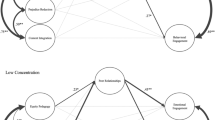Abstract
This paper strongly suggests that the views of minority students must be included in any meaningful assessment of teacher preparation programs' efforts to address racial diversity. The project was initiated during the 1990–91 academic year by interviewing minority juniors and seniors (total of 24), selected faculty, and administrators (deans, associate deans, department chairs) at two colleges of education as well as extensive document reviews. Intermittent follow-up interviews and document reviews continued through the 1993–94 academic year. These minority students did not feel that their teacher preparation programs had adequately prepared them to teach in racially diverse settings. Faculty and administrators agreed with the contention of the students but also pointed to a few tangible efforts that had been initiated to rectify this problem.
Similar content being viewed by others
References
Anderson, G. L. (1989). Critical ethnography in education: Origins, current status, and new directions,Review of Educational Research 59: 249–270.
Asante, Molefi K. (1987).The Afrocentric Idea. Philadelphia: Temple University Press.
Chinn, P. C., and Wong, G. Y. (1992). Recruiting and retaining Asian/Pacific American teachers. InDiversity in Teacher Education: New Expectations, Mary Dilworth (ed.), pp. 112–133. San Francisco, CA: Jossey-Bass.
Cummins, J., (1989).Empowering Minority Students, Sacramento, CA: California Association for Bilingual Education.
Foster, Michele (1991). “Just got to find a way”: Case studies of the lives and practice of exemplary black high school teachers. In Michele Foster (ed.),Readings on Equal Education: Qualitative Investigations into Schooling, vol. 11, pp. 273–294. New York: AMS Press, Inc.
Gollnick, Donna M. (1992). Understanding the dynamics of race, class and gender. InDiversity in Teacher Education: New Expectations, Mary Dilworth (ed.), pp. 63–78. San Francisco, CA: Jossey-Bass.
Haberman, M. (1989). More minority teachers.Phi Delta Kappan 70: 771–776.
Holmes Group (1990).Tomorrow's Schools: Principles for the Design of Professional Development Schools. East Lansing, MI: Michigan State University.
Holmes Group Forum (1990).Research on Cultural Diversity, vol. 6, no. 2. East Lansing, MI: Michigan State University, p. 9.
Irvine, Jacqueline J. (1992). Making teacher education culturally responsive. InDiversity in Teacher Education: New Expectations, Mary Dilworth (ed.), pp. 79–92. San Francisco, CA: Jossey-Bass.
Jackson, Kenneth W., and Swan, L. A. (1991). Institutional and individual factors affecting black undergraduate student performance: Campus race and student gender. InCollege in Black and White: African American Students in Predominantly White and in Historically Black Public Universities, Walter R. Allen, Edgar G. Epps, and Nesha Z. Haniff (eds.), pp. 127–142. Albany, NY: Suny.
King, Sabrina H. (1993). The shortage of African American teachers.Review of Research in Education 63: 115–149.
Ladson-Billings, Gloria (1992). Liberatory consequences of literacy: A case of culturally relevant instruction for African American students.Journal of Negro Education 61: 378–391.
Lanier, Judith, and Little, Judith (1986). Research on teacher education. InHandbook of Research on Teaching, 3rd ed., M. C. Wittrock (ed.), pp. 527–569. New York: Macmillan.
Lemelle, Sydney J. (1993). The politics of cultural existence: Pan-Africanism, historical materialism and Afrocentricity.Race and Class 35: 93–110.
Murrell, Peter C. (1992). Cultural politics in teacher education: What's missing in the preparation of minority teachers. InReadings on Equal Education: Qualitative Investigations into Schools and Schooling, vol. 11, Michele Foster (ed.), pp. 205–227. New York: AMS Press, Inc.
Scheurich James J. (1993). Toward a white discourse on racism.Educational Researcher 22: 5–10.
Schuhmann, Ana M. (1992). Learning to teach Hispanic students. InDiversity in Teacher Education: New Expectations. Mary Dilworth (ed.), pp. 93–111. San Francisco, CA: Jossey-Bass.
Smedley, Audrey (1993).Race in North America: Origins of a World View. Boulder, CO: Westview Press.
Stake, Robert E. (1991). Responsive evaluation and qualitative methods. InFoundations in Program Evaluation: Theories of Practice, W. R. Shadish Jr., Thomas D. Cook, and Laura C. Leviton (eds.), pp. 270–314. Newbury Park, CA: Sage.
Tatum, Beverly D. (1992). Talking about race and learning about racism: The application of racial identity development theory in the classroom.Harvard Educational Review 62: 1–24.
Watkins, W. H. (1993). Black curriculum orientations: A preliminary inquiry.Harvard Educational Review 63: 321–338.
Zimpher, Nancy L., and Ashburn, Elizabeth A. (1992). Countering parochialism in teacher candidates. InDiversity in Teacher Education: New Expectations, Mary Dilworth (ed.), pp. 40–63. San Francisco, CA: Jossey-Bass.
Author information
Authors and Affiliations
Rights and permissions
About this article
Cite this article
Parker, L., Hood, S. Minority students vs. majority faculty and administrators in teacher education: Perspectives on the clash of cultures. Urban Rev 27, 159–174 (1995). https://doi.org/10.1007/BF02354361
Issue Date:
DOI: https://doi.org/10.1007/BF02354361




